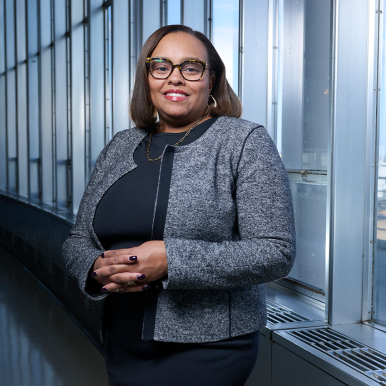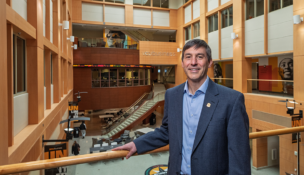
“Organizations are pulling back” from supporting DEI initiatives amid political and legal pressures, says Roanoke-based DEI consultant Jamica Love, formerly Virginia Military Institute’s chief diversity officer. Photo by Don Petersen

“Organizations are pulling back” from supporting DEI initiatives amid political and legal pressures, says Roanoke-based DEI consultant Jamica Love, formerly Virginia Military Institute’s chief diversity officer. Photo by Don Petersen
Left behind?
Chief DEI execs see roles dropped or redefined
In June 2022, Booz Allen Hamilton was without a chief diversity officer. The McLean-based Fortune 500 management consulting contractor’s chief diversity, equity and inclusion officer, Jon G. Muñoz, stepped down after a year in the role.
A year and a half later, Booz Allen hasn’t hired anyone new for the position — but that’s by design. Instead of hiring a new chief diversity officer (CDO) — a position that grew in popularity nearly 179% from 2019 to 2022, according to a LinkedIn study — the company restructured its leadership team in charge of diversity accountability.
Now, Betty Thompson, who has served as the firm’s chief people officer for 16 years, co-leads an executive council made up of senior vice presidents who represent different business sectors within the company. Thompson and her co-chair, Chief Engagement Executive Dennis Via, set the tone, strategy and expectations for Booz Allen’s diversity commitments, but each council member is responsible for holding their individual business areas accountable.
“To maintain sustained progress and impact, we’re learning you can’t have one person that everybody thinks is the owner of this,” says Thompson. “Progress and accountability need to be everyone’s responsibility.”
Booz Allen isn’t the only company reevaluating the way it structures leadership and accountability for diversity, equity and inclusion initiatives. As many companies made significant investments and leadership changes in 2020 in response to the Black Lives Matter movement that followed George Floyd’s murder by a Minneapolis police officer, firms are now confronted with the challenges that come with maintaining long-term commitments to DEI.
While some companies are holding fast to the commitments they made in 2020 or before, others have begun shifting titles and responsibilities, ultimately raising questions about what corporate DEI will look like going forward.
What’s in a name?
Looking at the 36 Virginia-based companies that made Fortune magazine’s Fortune 1000 list in 2023, it’s clear companies are rethinking the way they structure and lead DEI commitments.
Seven of the 36 firms have restructured their executive diversity role in the past two years, with some rearranging titles, some taking the word “diversity” out of the title altogether and others simply not hiring a new diversity official after one exits.
“We’ve definitely gotten into a new space and time where organizations are pulling back,” says Jamica Love, who resigned in June 2023 as the Virginia Military Institute’s chief diversity officer after two years in the role. “I really have felt it. I’ve seen it.”
Three of the Virginia-based Fortune 1000 companies — Boeing, Dominion Energy and Gannett Co. — changed titles for the leader overseeing DEI accountability, with the latter two companies removing the word “diversity” from the title altogether.
Dominion’s DEI program was headed by Maria Pia Tamburri until summer 2023, when Tamburri moved to head intergovernmental affairs for the Richmond-based energy utility and was replaced by Latoya Asia. While Tamburri’s title was vice president of DEI and employee engagement, Asia’s title is vice president of employee engagement and talent strategy. Asia’s responsibilities are the same as Tamburri’s were, a spokesperson for Dominion says, declining to comment further.
At McLean-based Gannett, the nation’s largest newspaper publisher, Kevin Terrell Heard has led the media conglomerate’s DEI initiatives since 2020. His title changed in July 2022 from diversity and engagement program manager to manager of inclusion and engagement programs. Gannett declined to comment.
“A lot of organizations have shifted their focus from diversity to more of an employee engagement approach,” says Tanisha Lewis, vice president of diversity, inclusion and social impact at the Metropolitan Washington Airports Authority. “Many of the diversity professionals are no longer called chief diversity officers or hold C-suite positions, but now have moved to more of an employee engagement or employee experience type of role.”
Unlike Dominion and Gannett, Boeing retained the diversity, equity and inclusion wording in their officer’s title, but added talent intelligence and employee listening.
“It doesn’t mean any departure from our existing commitments to equity, diversity and inclusion,” said Sara Bowen, who has headed the Arlington County-based aerospace and defense contractor’s diversity programs for five years and recently underwent a title change. “It just means I get to now work on really, really cool stuff in the employee listening and organizational research space, as well.”
Bowen’s title changed about a year and a half ago from vice president of global diversity and inclusion to vice president of global DEI, talent intelligence and employee listening. The additional focuses on talent and employee engagement go hand-in-hand with her DEI work, she says.
While most Fortune 1000 companies in Virginia include the word “diversity” in the title of the person in charge of programs focused on race, gender and underrepresented identities, those titles include a wide range of terms like inclusion, equity and human resources juggled around in various combinations.
When Stephanie Turner, who now serves as head of DEI for McLean-based not-for-profit government contractor Mitre, first started in the industry more than 25 years ago, the field was referred to as ethics and compliance, or affirmative action.
“Now you’ve seen people be a lot more creative and add on new things whether it’s belonging or culture,” says Turner. “Regardless of those changes, which to me are very superficial, the work never changed.”
Her title changed in March 2023 from vice president of inclusion, diversity and social innovation to vice president of diversity and chief sustainability officer. Like Bowen, Turner doesn’t see this shift as a shift away from designated diversity work, but rather as an opportunity to also focus on sustainability, which she believes intersects deeply with DEI goals.

Post-CDO
While some companies are shifting titles, others are doing away with chief diversity officers altogether. Along with Booz Allen Hamilton, three other Fortune 1000 companies in Virginia have lost chief diversity officers and not replaced them.
After Markel Group’s managing director for talent, diversity and inclusion, Trevor Gandy, left the Henrico County-based insurance holding company in late 2022, Markel transitioned his responsibilities to Joanna Browning, who has been with the company for more than 20 years and currently serves as senior managing director of people experience. Markel confirmed Browning has taken over Gandy’s responsibilities but declined to comment on the switch.
Ashburn-based IT company DXC Technology lost its global director of DEI in December 2022, but does not appear to have hired anyone new under that title and did not respond to requests for comment. Similarly, Arlington real estate investment trust AvalonBay Communities lost its director of DEI in October 2023 and has yet to re-hire and did not respond to requests for comment.
“People are saying that they’re still doing the work, but they’re ratcheting down,” says Love, adding that she’s seen a trend of companies not re-hiring after a chief diversity executive leaves or replacing the position with a role that has less authority or a less explicit connection to racial diversity.
Chief diversity officers’ primary role is to ensure diversity remains a priority within a company, and that a company is taking real action to meet diversity and inclusion goals. On average, companies that have a more diverse workforce, which is typically a main objective of CDOs, financially outperform those that don’t, according to research from global management consulting firm McKinsey & Co.
Booz Allen has transitioned away from a single officer overseeing diversity work and moved toward embedding DEI across the company because of how far-reaching diversity work is, according to Thompson, as it can encompass everything from hiring, workforce development and retention to outward facing initiatives, community engagement and environmental governance.
“A true commitment to DEI means it must be built in — not bolted onto — the culture,” says Thompson.
A reckoning, four years on
After Floyd was murdered in May 2020, companies reacted with significant verbal and monetary pledges to address racial disparities. In 2021, those commitments remained overarchingly strong, according to McKinsey. In 2022, however, those metrics started to decline.
From May 2021 to October 2022, the pace of such monetary commitments from Fortune 1000 companies slowed 32%, according to a February report from McKinsey. Companies were also making relatively fewer public statements in support of racial justice, with the most significant decline seen in internal commitments.
“A lot of organizations didn’t understand what a heavy lift supporting a DEI effort requires,” says Lewis. “Organizations don’t always fully understand the commitment, and so, sometimes the support isn’t there for the programs so they can be successful.”
Nationwide, chief diversity officers have a turnover rate about twice as high as other executive roles, with an average tenure of 1.8 years, according to data from leadership consulting firm Russell Reynolds Associates. Among Virginia’s Fortune 1000 companies, the average tenure for CDOs is less than 2 1/2 years.
Since chief diversity roles began to grow exponentially in popularity, firms like McKinsey have found CDOs are often given overly ambitious or poorly defined job requirements and frequently lack the authority and support from leadership to execute their work.
“Usually, chief diversity officers have very small teams, very small budgets, and actually kind of lack the authority to make big decisions,” says Bowen at Boeing. “You have to achieve through influence, and that can be tough if you’ve got resistance from above.”
Both Love and Lewis referred to “political pressure” that companies are increasingly facing when it comes to diversity efforts. Despite the fact that more than 90% of 322 U.S. executives surveyed by employment law firm Litler in November 2023 said they were expanding or maintaining DEI programs, 59% of the C-suite execs also noted a significant increase in the backlash toward DEI efforts since June 2023.
That’s when the Supreme Court issued its ruling rolling back affirmative action in higher education institutions, which has informed some reverse racism lawsuits against companies like Gannett. Meanwhile, conservative think tanks like The Heritage Foundation have been targeting DEI efforts in higher education, also a hot topic in Virginia.
In April, Virginia’s chief diversity officer, Martin Brown, appointed by Republican Gov. Glenn Youngkin, said in a speech at Virginia Military Institute that “DEI is dead,” and it only existed on a state level because the General Assembly required it.
Love announced her resignation from VMI, the nation’s oldest state-funded military college, a little over a month later. “I felt I had accomplished everything I could at VMI,” she says of her resignation. VMU has since tapped an interim CDO.
As the school’s first chief diversity officer, Love was in the crosshairs of intense debate from VMI’s majority white student body and alums. Critiques included claims from alumni and conservatives that VMI was attempting to establish critical race theory, a concept that was banned in Virginia K-12 schools by Youngkin.
“I think every company is a reflection of the society we live in,” says Bowen. “I think our country has become more divisive over the past couple of years politically and socially.”
As Love continues working in DEI as a consultant, she remains as dedicated to the work as ever, she says.
“At the end of the day, I don’t care what title you give me,” Love says. “Can I do the work? Do I have the support? Do I have the freedom to do the work? That’s what’s most important to me.”
-

















